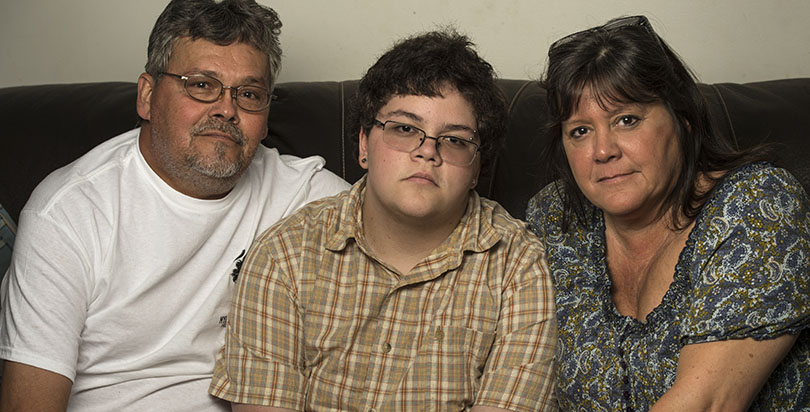SCOTUS to Hear Virginia Transgender Case With Big Implications for Ed Policy and Beyond

Just before her junior year, Evancho’s family told high school officials she would return as Juliet. She’d no longer go by her birth name, Jacob. Neither her peers nor her teachers seemed to mind her new name, her feminine wardrobe or that she was using the girls’ bathroom — until September.
That’s when she found out that the Pine-Richland School Board in suburban Pittsburgh had voted 5–4 to reverse the district’s longtime policy of allowing transgender students to use restrooms and locker rooms that match their gender identities. Evancho felt as if a rug of safety and acceptance had suddenly been ripped from under her feet.
Since then, she said, it’s been hard to focus on homework, and she avoids going to the bathroom at school so she doesn’t have to use the unisex restroom. Fighting against perceived discrimination, she and two other transgender students filed a federal discrimination lawsuit against the district.
“All the girls were completely OK with me being there,” Evancho, who is now 18, told The 74. “It blows my mind that it’s an issue now.”
Across the country, students, parents, school officials, advocates, legislators and judges have found themselves in fierce debates about which bathrooms transgender students should use. In the coming days, however, the U.S. Supreme Court could decide whether it will hear a similar case, involving a transgender boy from Virginia, and finally give transgender students like Evancho some much-needed clarity.
Earlier this month, the court put off deciding whether to take that case. Now, political interests on all sides of the debate are closely watching the court’s October 31 session for a decision on whether justices will hear the case involving Gavin Grimm, a 17-year-old high school senior from Virginia who was born biologically female but has identified as male for years.
“The reality here is, the weight of authority is already on our side,” Omar Gonzalez-Pagan, one of Evancho’s lawyers, said of decisions already made by local judges on transgender students’ rights. “We’ll see where the ball is headed.”
Grimm sued in 2014 after the Gloucester School Board adopted a policy that required students to use the bathrooms and locker rooms that match their biological gender. Students with gender dysphoria, like Grimm, would be allowed to use private bathrooms.
Eventually, the Fourth Circuit Court of Appeals ruled that the new policy was unlawful, based largely on a federal Department of Education letter saying the school district must treat transgender students in a manner consistent with their gender identities. In August, the Supreme Court ruled 5–3 to temporarily block that ruling, pending a decision by the high court to hear the case.
(Read: After Caitlyn Jenner, a New World for Transgender Students — and a New Civil Rights Battleground)
Meanwhile, the Obama administration has thrown its weight behind Grimm and other transgender students. The Departments of Education and Justice issued a sweeping directive in May, saying schools nationwide must allow students to use restrooms and locker rooms that match their gender identity or they could lose federal money under Title IX, the law that prohibits sex discrimination in education. That letter prompted a federal lawsuit from 13 states, and just last week, a federal judge in Texas reaffirmed an August ruling that bans enforcement of the directive nationwide. The judge ruled that the administration had failed to follow proper notice and public-comment procedures before creating new guidelines.
Some of the parties that have filed briefs with the court, such as evangelical religious groups worried about students’ privacy, aren’t surprising. But others, like a self-described group of radical feminists, are more shocking. For some of the groups, political interests extend far beyond school bathroom stalls. Here are some of the personalities driving the fierce debate:
The American Civil Liberties Union may have helped Grimm sue his school, but his attorney isn’t looking to rush the case to the Supreme Court. In response to the Gloucester County School Board’s appeal to the Supreme Court, the ACLU said Grimm’s case marks the first time courts have ruled on whether Title IX allows schools to exclude transgender students from restrooms consistent with their gender identity. Because similar cases are percolating through the legal pipeline, the ACLU argued, the court should wait to see whether federal appeals courts produce a consensus or a circuit split.
“From our standpoint, Gavin needs to be using the bathroom, and the only thing standing between him and using the bathroom is the stay issued by the Supreme Court,” said Joshua Block, the ACLU attorney representing Grimm. “So the sooner the Supreme Court denies cert [refuses to hear the case], the sooner he will be using the restroom like everyone else.”
The ACLU’s brief is the only one that asks the justices to pass on the Grimm case. The ACLU asked other supporters to hold off, Block said, because filing additional briefs would elevate the case’s importance.
“The process of having different courts consider these issues, hear the stories of different people and consider these questions in a more slow and deliberative process, I think, helps inform the entire conversation about who trans kids are and what the reality of these policies are,” Block said. “The more concrete cases you have illustrating that the arguments made on the other side are just disconnected from the reality on the ground, I think, the better it is for when it eventually reaches the Supreme Court.”
But that doesn’t mean other LGBT organizations aren’t interested in having the court settle the debate.
Nathan Smith, director of public policy at the Gay, Lesbian and Straight Education Network, wants clarity. The Education Department’s new guidelines and the subsequent federal lawsuit created a “patchwork of protection for trans students,” he said.
Smith said it’s possible the court could choose to hear the Grimm case, the Texas judge’s injunction or a similar case. In any case, he said, it’s important for the justices to provide guidance.
“When you look at the courts that have heard cases so far,” he said, “they are almost always on our side. At the end of the day, I feel strongly that this is a question we will win.”
(Read: No Excuses on Transgender Student Rights: DOE Doubles Down, Warns IL District It Could Lose Funds)
Jonathan Adler, a law professor at Case Western Reserve University, said he isn’t “particularly hostile” to policies that grant inclusive bathroom rights to transgender students. Adler and a handful of groups that filed briefs asking the Supreme Court to hear the Grimm case have an interest that lies in something far less sexy: administrative law.
For him, the heart of the case centers on whether courts should defer to the Education Department’s interpretation of Title IX. When the department sent a letter to Grimm’s school, and subsequently released guidance documents for all schools, it didn’t go through proper rulemaking procedures before creating a new interpretation of “sex,” Adler said.
An agency interpretation that doesn’t first go through formal notice-and-comment rulemaking “undermines due process, the separation of powers, and the rule of law,” according to Adler’s brief, which he filed with the libertarian Cato Institute. In such scenarios, the brief argued, federal agencies are granted the ability to rewrite federal law without involving Congress, simply by reinterpreting a “purported ambiguity” in the law.
“Whatever one thinks of the merits of the agency’s position, or whether or not this is a position that the agency should be able to adopt, there’s something problematic about a mid-level bureaucrat writing a letter to an interested party and that suddenly becoming the binding interpretation school districts and others now have to follow,” Adler said.
In his brief, William Bennett, education secretary under President Ronald Reagan, said he had an interest in the case because it offered a “radical new interpretation” of Title IX — one Congress couldn’t possibly have intended when lawmakers approved it in 1972. To make his point: a 1961 edition of the Oxford English Dictionary that defined “sex” as “differences in the structure and function of the reproductive organs.” His brief noted that an “obscure magazine” appeared to coin the term “transgender” in 1969 and that the term didn’t “enter the general lexicon” until the late 1980s.
Congress approved Title IX, Bennett said, because it aimed to eliminate sex discrimination based on an “immutable characteristic” — an “accident of birth,” like race or national origin. Adopting a broader definition, he argued, put students in danger from students whose only desire is “voyeurism or, worse, abuse.”
How should women respond to policies that grant bathroom access to people who were born with male sex organs but identify as female? Somewhat unexpectedly, a split between feminist groups has emerged in the Grimm case.
The Women’s Liberation Front (WoLF), a self-described group of “radical feminists dedicated to the liberation of women,” argued in its brief to the Supreme Court that the Education Department’s interpretation of “sex” gives men “unfettered access” to women’s facilities and “strips women and girls of the rights and protections Congress expressly gave them in Title IX.”
David Bookbinder, an attorney who filed the brief on WoLF’s behalf, said the organization maintains a belief that people cannot transition to a sex different than their birth gender.
“No man can become a woman, because being a woman is a female experience; it’s based on the decades of life and experience of being a woman,” he said. “Your body will never be a female body no matter what you do to it.”
Although the Women’s Liberation Front is the only feminist group to file a brief with the Supreme Court in Grimm’s case, it by no means represents the perspectives of all feminist organizations. Before the Fourth Circuit heard the case, a group of women’s rights organizations, including the National Women’s Law Center, argued that discrimination against a student for being transgender is, in fact, sex discrimination. By denying transgender students appropriate bathroom accommodations, the brief concluded, schools are effectively excluding them from the ability to attend public schools “except at the price of daily humiliation and stigma.”
“It would also undermine the broad remedial purpose of Title IX, lending credence to outmoded and harmful sex stereotypes, and making it more difficult for all students to maximize their potential and enjoy equal educational opportunities unimpeded by discrimination because of sex,” according to the brief.
(More coverage: New York City’s First-Ever LGBT Student Liaison Aims to Set National Example)
While the Supreme Court mulls whether to consider the Grimm case, school districts have been scrambling to come up with their own guidelines.
The Rochester School District in New Hampshire adopted a policy in October allowing transgender students to use the bathroom that corresponds to their gender identity. A handful of other school districts in the state, including Durham, Portsmouth, Dover and Hampton, had already done the same.
In Maryland’s Anne Arundel County Public School District, officials caught some flak when they released a training video for educators earlier this year that said schools should allow transgender students to use a private bathroom or the bathroom that corresponds with their gender identity. The school system had been following these guidelines for at least two years, spokesman Bob Mosier said.
“It is part of our belief that where the single goal [of the school system] is to educate all students and eliminate all gaps, that all means all,” he said.
But County Executive Steven Schuh argued in a letter to the school board that at some point, accommodations for transgender students “begin to affect negatively the rights and educational experiences of other students in our county.”
Get stories like these delivered straight to your inbox. Sign up for The 74 Newsletter

;)


